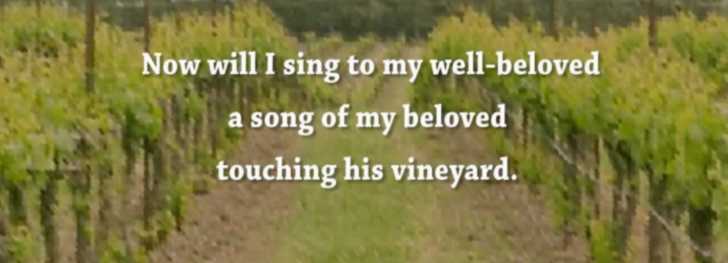
“I will sing for the one I love a song about his vineyard…” Isaiah 5:1-7 This chapter of Isaiah seems to begin on a high note, but the tone of it changes before our eyes and we are drawn into a reality that sends a shiver down the spine, that stops us in our tracks. It is intended to be a wake up call to the Israelites and, if we are listening well, it is a wake up call for us in our own times.
With the opening lines of the chapter we are given the impression that this song will be a lovely, pastoral, song of joy. But even before the first verse is finished there is a hint of darkness in the use of the past tense of the verb “to have.” “My loved one ‘had’ a vineyard on a fertile hillside…” And that subtle use of language is what we need to focus on. Verse 2 continues to describe the work that was done by the loved vine master, the preparation of the ground, the planting of the choicest of vines, the building of a watchtower to watch over the vineyard and a wine press in anticipation of a bountiful harvest. It tells us that the loved one then waits and looks for a crop of good grapes. And why not? He has done all that needed to be done. He has given his all to the project with loving care and careful support. And here again, we are confronted with the power of small words. In the second verse, after all of the energy of preparation and care has been carried out, it ends darkly. “But it yielded only bad fruit.”
That first word, “but,” pulls us up short. And it should. For it introduces the rest of the story. The vineyard we are told in verse 7 is the nation of Israel, and the people of Judah.The loved one Isaiah is speaking about is the Lord Almighty himself. Isaiah is addressing this parable to them. The Lord built the vineyard and gave it all that it needed to produce good fruit, but Isaiah tells us that though the Lord took delight in his vineyard, the people of Israel, his chosen children, he found in them not justice, but bloodshed; not righteousness, but cries of distress. And the Lord says, “What more could I have done for my vineyard than I have done for it” (verse 4)? Then he tells us what the Lord is going to do to his vineyard and this is the centerpiece of the passage. He will take away its hedge and break down its wall. He will take away its protection. And with that gone, the vineyard will be trampled and become a wasteland and it will be covered with thorns and briers. And “I will command the clouds not the rain on it” (verse 6). These words, we can imagine, sent a shiver down the spine of the Israelites, the people of Judah.
Well, it should send a shiver down our spines as well today. We too are the vineyard of Christ. Can we say that our times are just and righteous. Can we say that we are just and righteous in all of our relationships with others, or with God as Christians? If a critical mass of those who call themselves Christians were indeed righteous and just in the way that God commands us to be would the social fabric of our “Christian” country be so tattered, marred, and fragile as it is today? We must hear and listen humbly to the Holy Spirit’s words coming to us in this reading of Isaiah with the same fear and trembling as the Israelites did when Isaiah addressed them with these words. This is a clarion call. It is an alarm bell to us. We must honor the One who built the vineyard by knowing him, by understanding his just commands, and by living in accord with them in our daily lives. If all Christians heeded the vine master’s, that is, God’s commands in their daily lives, the world would be very different than it is. That is what God made us for. We are to be the wine of justice, the fruit of righteousness in this world These words are speaking directly to us right now, right here, in this time, on this day. Will we listen?
Lord, Help us to see the errors of our ways. Give us humble and contrite hearts that hear and answer your call in every thought, word, and deed. You alone are the giver of life. Grace us with the wisdom and the courage to know you, to love you, and to serve you with our daily lives so that we can produce good fruit in all that we think, say, and do. We pray in Jesus’ name. Amen.
SKM: below-content placeholderWhizzco for FHB

